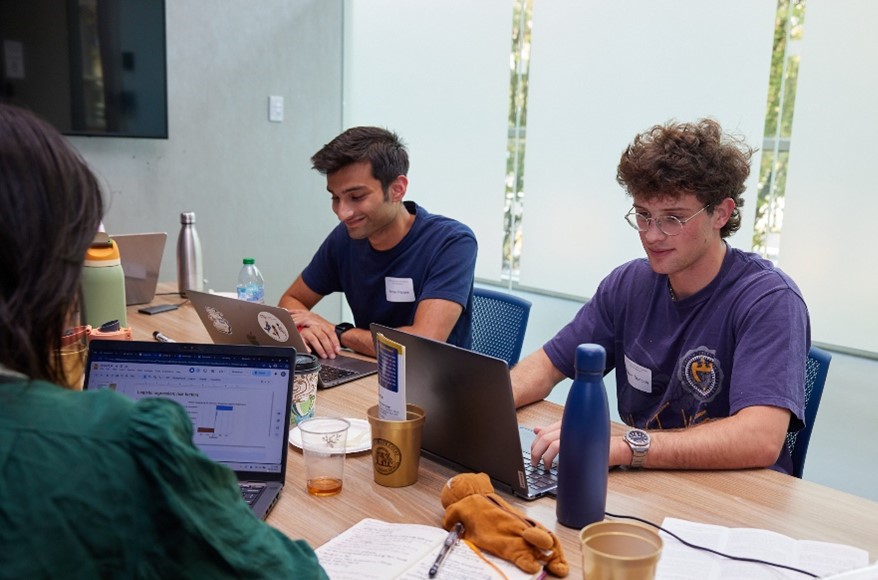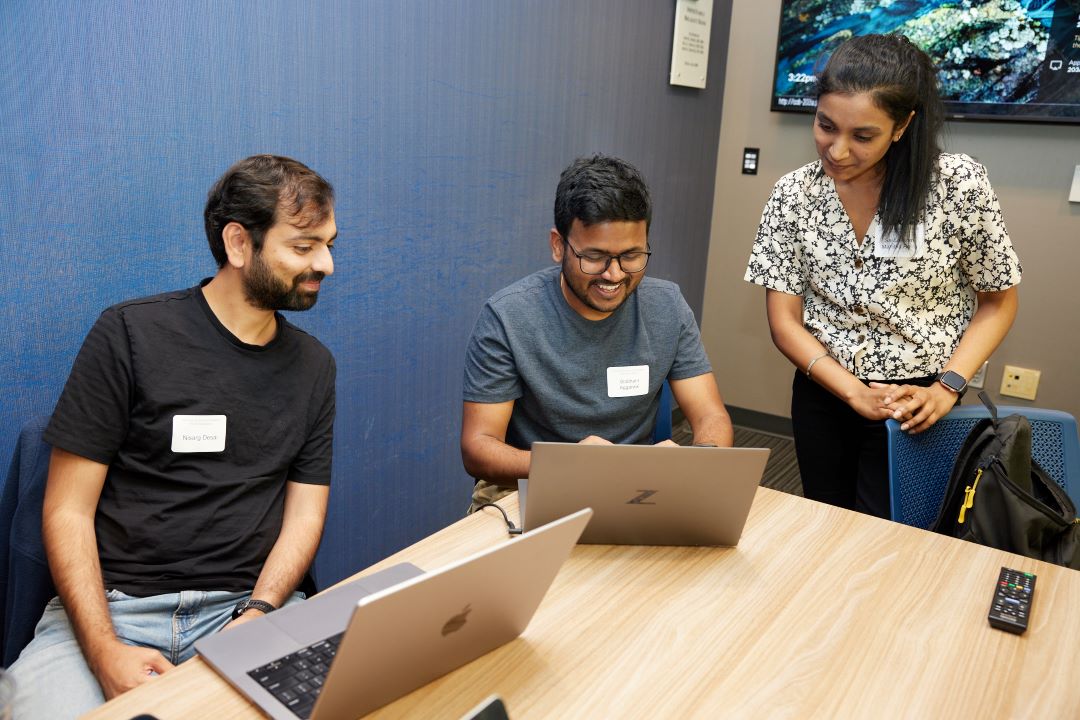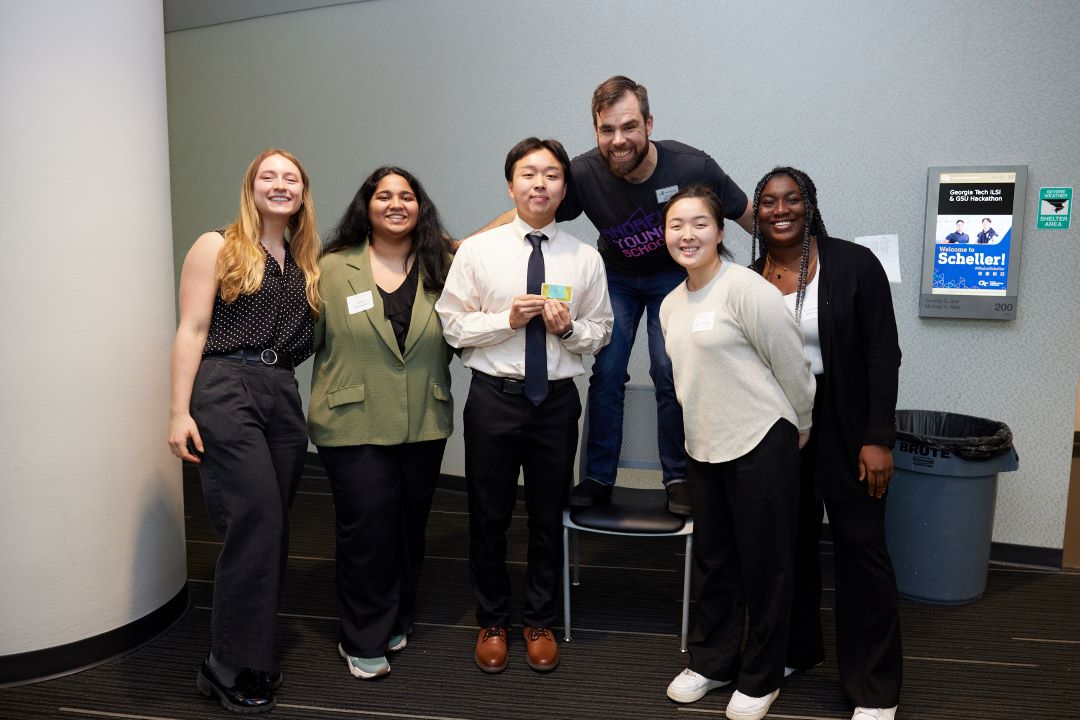On Saturday, October 18, Georgia Tech’s Scheller College of Business Law, Data, and Design Lab and the Institute for Leadership and Social Impact with Georgia State University’s Andrew Young School of Policy Studies came together for a one-day Tech for Change: Housing Access and Stability Mini-Hackathon, an event designed to put data and technology to work for social good. This event was made possible by funding provided by the Public Interest Technology University Network.
Over the course of the day, 32 students from both universities collaborated in six interdisciplinary teams, tackling complex housing issues faced by Metro Atlanta communities. In partnership with local government and nonprofit organizations, participants explored innovative ways to make housing more accessible and stable for all.

The day began with two problem briefings led by subject matter experts. Judge Bray Taylor and Georgia Tech alum Judge Cheryl Treadwell, from the Fulton County Magistrate Court, introduced the Housing Stability challenge, describing how dormant eviction filings in Georgia’s Magistrate Courts can impact tenants long after rent disputes are resolved. Chief Magistrate Judge Shawn Rhodes from the Wilcox County Magistrate Court joined as well to provide a perspective from a rural court. James Alexander, President of Mercy Housing Southeast, presented the Housing Access challenge, focusing on how data could help identify optimal sites for affordable housing development through Georgia’s Housing Tax Credit Program.
With these insights, teams spent the day brainstorming, coding, and analyzing data to develop actionable solutions, ranging from data-driven mapping tools to predictive models for policy decision-making.

Projects were evaluated by a panel of experts representing both academia and community partners: James Alexander, President of Mercy Housing Southeast
Chief Magistrate Judge Cassandra Kirk, Fulton County Magistrate Court
Carolyn Kovar, Assistant Director, Housing Delivery at City of Atlanta
Fei Li, Associate Professor and Graduate Program Director in the Urban Studies Institute at Georgia State University
Judge Bray Taylor, Fulton County Magistrate Court
Judge Cheryl Treadwell, Fulton County Magistrate Court
Dan Pasciuti, Associate Professor in Sociology and Associate Director of Graduate Studies in Sociology at Georgia State University
The judges praised the students’ creativity and problem-solving skills. James Alexander remarked, “The students were impressive in developing creative solutions to a really tough problem.” Bray Taylor added, “I was impressed by what the students were able to accomplish in such a short period of time.”
At the end of the day, two teams were awarded first place honors, one for Housing Access and one for Housing Stability, in recognition of their creative, data-informed approaches to Atlanta’s housing challenges.

Members of the first place team for Housing Access with Adam Pah, Assistant Dean for Research and Digital Innovation at GSU; Taylor Witte (B.S. in Econ/Math, GT '27), Nithya Kasaraneni (M.S. in MGT ,GT '26), Cade Zhang (BSBA, GT '28), Jenny Zhang (B.S. in CS, GT '27), and Anuoluwa Aruleba (M.S. in Data Analytics and Actuarial Science, GSU '27)
In addition to problem-solving, participants had the chance to make a direct impact by contributing donations to Legal Aid Atlanta or HousingATL, organizations that provide crucial support to local residents facing housing insecurity.
The event highlighted the power of collaboration between universities, government, and nonprofits and showed how students can use technology not only to innovate, but to create meaningful social change.
The Institute for Leadership and Social Impact (ILSI) is an interdisciplinary institute at Georgia Tech dedicated to promoting servant leadership and advancing organizational practices that contribute to a more just, caring, and sustainable world. Through experiential learning, research, and community partnerships, we nurture leaders who drive meaningful social change—locally in Atlanta and globally. To learn more about our initiatives and programs, visit our website.
